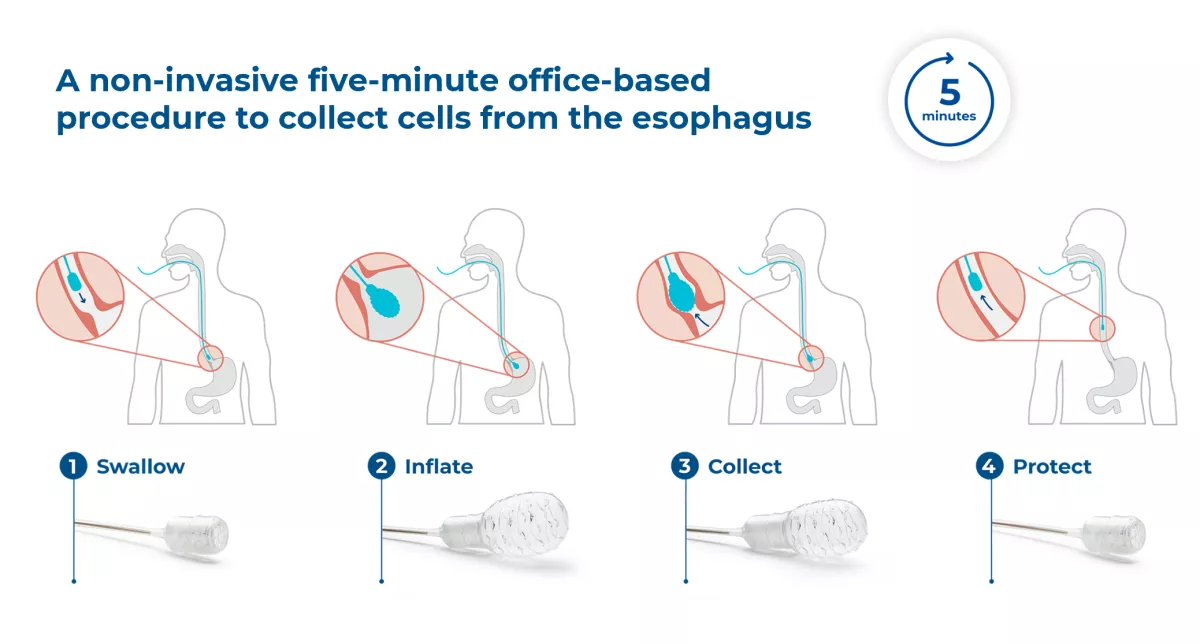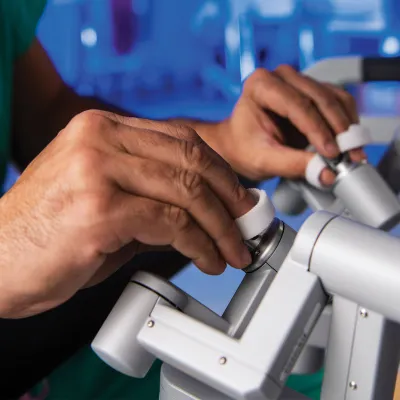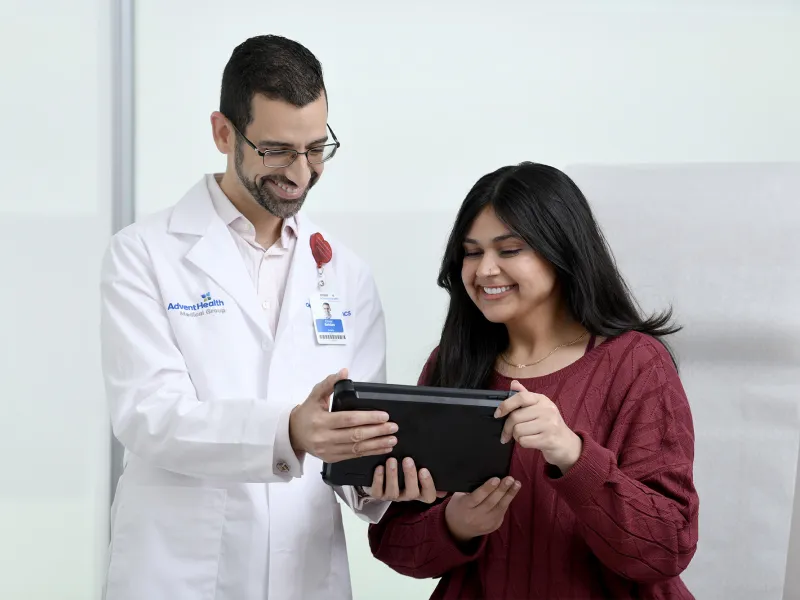Minimally Invasive Esophageal Cancer Treatments
Our AdventHealth Digestive Health Institute surgeons are leading experts in minimally invasive surgery to treat esophageal cancer. Cancer that affects the esophagus — the tube that allows food to go from the throat to the stomach — is believed to be caused by chronic irritation.
There are two main kinds of esophageal cancer. One is squamous cell carcinoma, which is linked to smoking, chewing tobacco, alcohol use, poor nutrition and even drinking beverages that are too hot. The other kind of esophageal cancer, adenocarcinoma, which is linked to gastroesophageal reflux disease (GERD), obesity and Barrett’s esophagus. Unfortunately, esophageal cancer is on the rise in the U.S., with an especially dramatic increase in esophageal adenocarcinoma.
To view actual footage of these surgical procedures, please visit the PROCEDURE VIDEOS and ADDITIONAL RESOURCES page in the For Medical Professionals section of the site.
Whole-Person Care for Esophageal Cancer
If you or a loved one has been diagnosed with an esophageal cancer, you may be familiar with some of the symptoms.
Esophageal cancer symptoms can include:
- Reverse flow of food back up through the esophagus
- Difficulty swallowing food or drink
- Pain or sensation that food is catching after swallowing
- Chest pain a few seconds after swallowing food
- Weight loss due to difficulties with eating
- Heartburn
- Vomiting blood
- Persistent cough
If an esophageal tumor is suspected, patients may have tests such as:
- Imaging tests such as a barium swallow study,MRI scan and/or CT scan
- An upper endoscopy procedure that uses fine needle aspiration biopsy to remove samples of cells from the esophagus for evaluation under a microscope
- A biopsy, in which cells are collected and then studied by a pathologist, who determines if they are cancerous. The pathologist also determines which type of esophageal cancer is present.
- Staging is done based on the tumor size, how far deep it extends into the layers of the esophagus, whether or not it involves nearby lymph nodes, and whether or not it has spread to other organs. Together, this information helps doctors determine the best options for treatment.
When esophageal cancer has not spread to other parts of the body, the standard treatment is surgery to remove the diseased part of the esophagus. Rarely, esophageal cancer is detected in its early stages, when it may be able to be treated through therapeutic endoscopy. Most often, surgery is necessary, either before or after radiation therapy and chemotherapy. If radiation treatment is needed to shrink the tumor before surgery, there is usually a four-week recovery period between radiation and surgery. For smaller, early stage tumors, surgery may be the first treatment.
Robotic Esophagectomy
The surgery most often performed for esophageal cancer is an esophagectomy, which involves removing part or all of the esophagus. A new food tube is then constructed by using part of the stomach or colon. At Digestive Health Institute, our surgeons perform this surgery as a minimally invasive procedure with the help of the surgical robot. Having a robotic esophagectomy is often preferable to an open procedure. If performed by skilled surgeons, it has superior outcomes with a significantly faster recovery.
EsoGuard™ and EsoCheck™
The GERD and Esophageal Cancer Center offers EsoGuard™ diagnostic screening. The leading-edge procedure pairs a biomarker test with new technology for a five-minute, non-invasive screening done in an office setting without sedation.
EsoGuard™ uses next-generation sequencing that detects precancerous cells in the esophagus. The procedure uses a device called an EsoCheck™, which consists of a textured balloon roughly the size of a daily vitamin or gel capsule attached to a thin silicone catheter. The patient swallows the EsoCheck™, which inflates when it reaches the stomach; most patients have minimal or no discomfort.
Once the placement is confirmed, the balloon is pulled back through the esophageal junction. Textured ridges on the surface collect sample cells from the esophagus. Before removing the EsoCheck™, negative pressure retracts the balloon into the capsule to protect the contents from contamination during retrieval. It is then placed into a preservation solution and transported to the testing facility. Results are typically available within two to three weeks.
Before being scheduled for EsoGuard™, patients must meet certain criteria. Most have a history of chronic reflux for at least five years and are age 45 or older.

Surgical Cancer Care
-
Esophageal Cancer
Typically esophageal cancer requires surgery in addition to radiation and chemotherapy. Learn more about the surgical treatments our specialists can provide.
-
Gastric (Stomach) Cancer
We help diagnose and treat stomach cancer. We even have minimally invasive options. Learn more about how our gastroenterologists can help you.
-
Duodenal/Small Bowel Cancer
Our gastroenterologists diagnose and treat small bowel and duodenal cancer. We offer three minimally invasive treatment options.
-
Pancreatic Cancer
Our surgeons are among the region’s most experienced in pancreatic surgery. We can help treat your cancer with minimally invasive options. Learn more today.
-
Liver Cancer
Our AdventHealth Digestive Health Institute surgeons offer surgical and non-surgical liver cancer treatments, depending on your specific case. Schedule an appointment with one of our gastroenterologists.
-
Gallbladder Cancer
Removing the gallbladder with cancer is a very complex surgery that requires highly experienced surgeons like those at AdventHealth Digestive Health Institute.
-
Colon and Rectal Cancer
Our experienced gastroenterologists can diagnose and treat colon and rectal cancer. Learn more about treatment and surgery options.
-
Anal Cancer
Our colon and rectal surgeons can help diagnose and treat anal cancer. We offer anal cancer surgery when necessary.
-
Public Reporting of Outcomes
Our compassionate medical staff is committed to providing high-quality healthcare services in Hillsborough County.

Recover Faster With Minimally Invasive and Robotic Surgery
The expert surgeons at the AdventHealth Digestive Health Institute have a large depth of experience in offering minimally invasive surgery.

Meet Your Dedicated Experts
Our specialists are passionate about providing collaborative care that addresses your unique needs and goals while ensuring you feel informed and supported every step of the way. Learn more about our team and their areas of expertise.

Surgical Consultations For Digestive Cancer Without the Wait
Appointments Within Seven Days for Patients with Cancer
At AdventHealth Digestive Health Institute, we know that after being diagnosed with cancer, patients want and often need to begin treatment quickly. So we make it a priority to offer appointments for cancer surgery consultations within five business days, and often earlier.
Patients who are newly diagnosed with cancer, or have just found out they have cancer again, qualify for this priority access. Our surgeons will make themselves available to see you right away, even for a second opinion. We want to help you start your treatment as soon as possible.
Let Us Help You Feel Whole Again
Whether you’re experiencing new symptoms or want a second opinion on a diagnosis, our dedicated digestive health experts are here to help you find answers and a path forward. Request an appointment today to take charge of your health and get the personal support you need.
